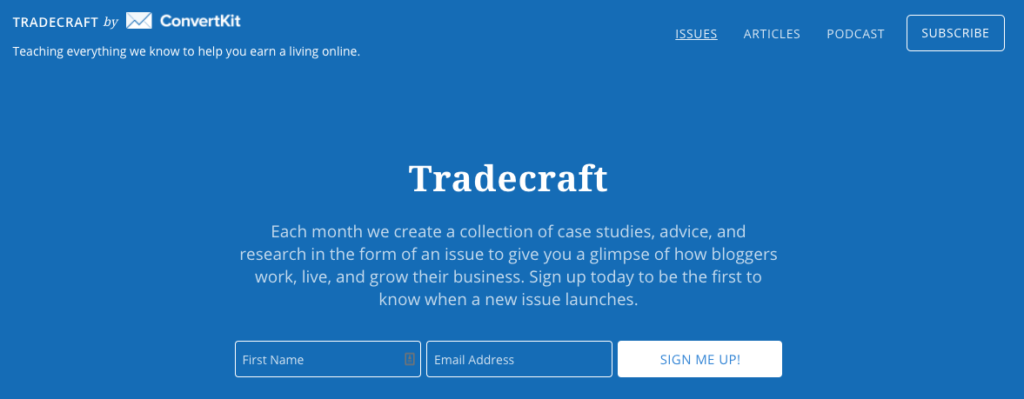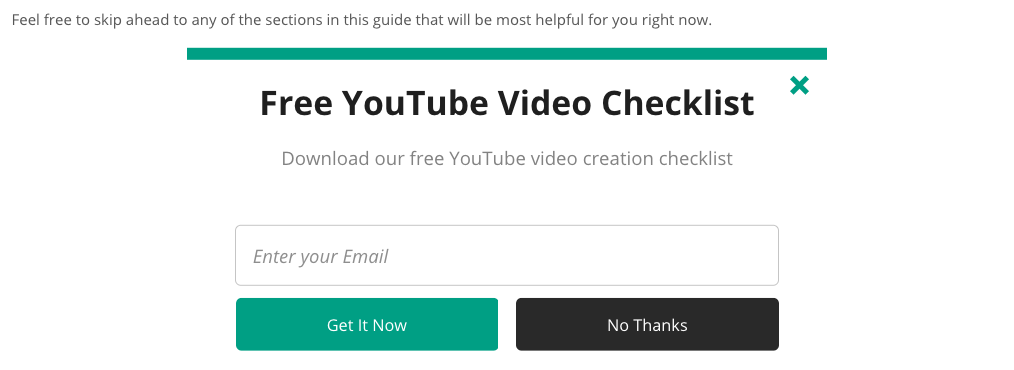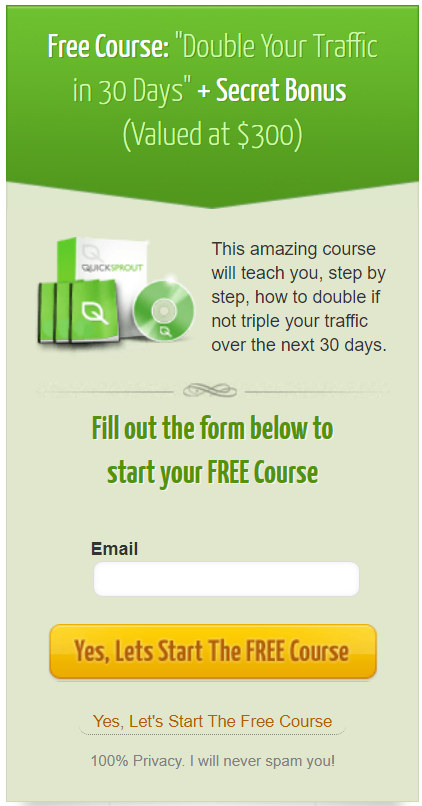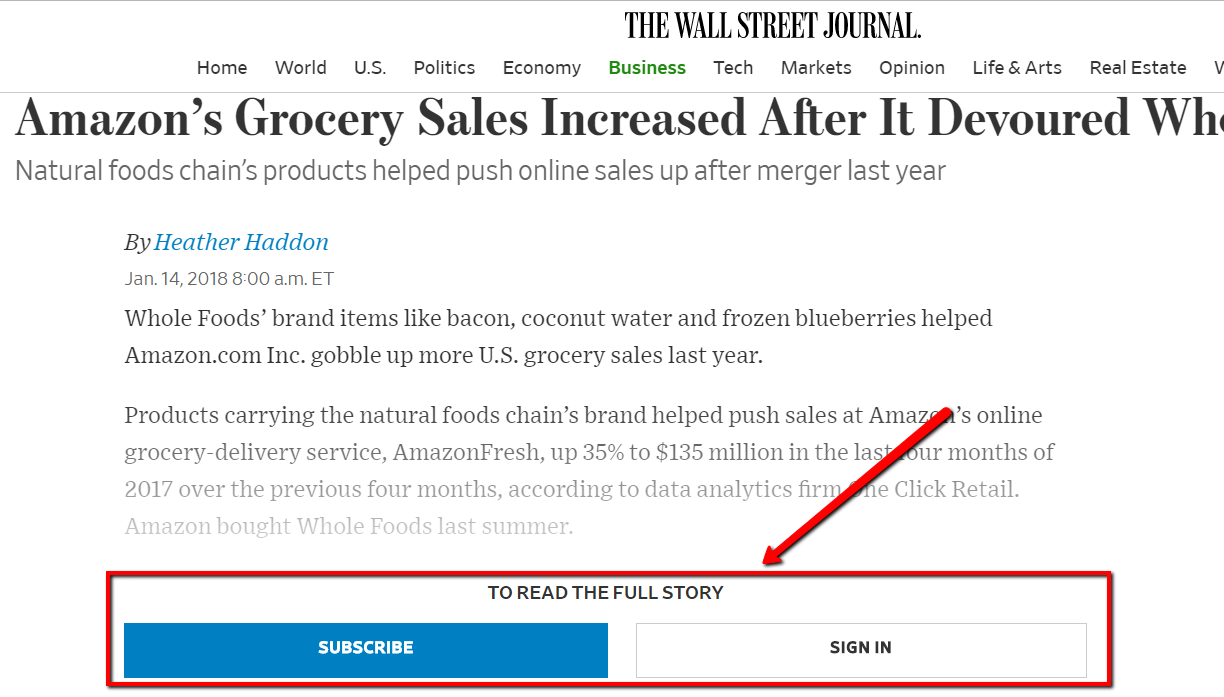The right way to approach online marketing can be summed up in one phrase: give value to receive value.
It’s as simple as you can get when defining the foundations of a successful marketing campaign. If you want to sell a product or service, promote the solution. If you want to build your email list, give away valuable information that helps your target audience for free.
It’s the approach that internet personality and digital marketing agency owner Gary Vaynerchuck devoted an entire book to: give, give, give, then ask.
On a practical level, one of the most popular ways to implement this approach is to offer a free resource (aka an opt-in bribe or a lead magnet) in exchange for someone’s email address.
The goal isn’t necessarily to generate an immediate sale. It’s to earn permission to contact your prospect directly with the intention of eventually inviting them to purchase your product or service, but only after you’ve earned their trust by providing them with helpful information over a period of time. Give value first, ask for the sale later.
But not all lead magnets are created equally, and some types of lead magnets convert website visitors into email subscribers more effectively than others.
In this article, I’m going to reveal 3 types of lead magnets that continue to do a good job of converting website visitors into email subscribers.
Create and publish a lead magnet funnel in minutes with Thinkific Funnels
Leveraging our AI powered funnel, build and publish a landing page to offer a free digital download to your prospects in return for their email addresses.
3 types of lead magnets that actually convert:
1. A free PDF guide (yes, these still work!)
First and foremost, let’s address the big elephant in the room…
When you hear the term “lead magnet”, you probably think of a free eBook or a PDF guide. You probably even have a few dozen unread PDF guides saved on your computer that you plan to read… eventually. (Don’t feel bad, it happens to the best of us!)
So you might be asking yourself whether or not PDF guides are still effective lead magnets.
It’s a fair concern to have. And the answer is: it depends.
Yes, as an overwhelming amount of free content has been published online over the past few years, the perceived value of a lengthy ebook or PDF guide has decreased. But there are still plenty of companies that are producing high-quality PDF guides for their audience.
ConvertKit, for example, produces incredibly well-written and valuable PDF guides to help people learn how to grow their online business. They produce these on a monthly basis, and they even have a special name for them (“Tradecraft”). You can check them out here.

But if all you’re doing to create your PDF guides is recycling generic content that is hardly helpful for your target audience, then don’t be surprised if your conversion rates are low or those guides sit unread in the download folders of your subscribers.
Unless you’re prepared to produce truly epic content for your PDF guides, a better approach is to offer a free checklist, worksheet, case study, or industry report that your subscribers can consume quickly and implement immediately. PDF downloads that help your subscribers achieve a quick win or learn a new and relevant insight generally have a higher conversion rate than lengthy ebooks and PDF guides.
In Thinkific’s in-depth article on creating a YouTube video marketing strategy, for example, they include a YouTube video marketing checklist as their lead magnet. This lead magnet directly relates to the article and helps readers implement what they learn without having to spend a significant amount of time reading an in-depth guide:

2. Access to an online course
Today, more and more brands are using online courses and webinars as lead magnets. Thought leaders like Neil Patel, for example, use free courses as an integral part of his company’s lead generation efforts:

It may initially sound like a monumental task, but it’s actually easier than ever to create an online course and offer it as a lead magnet. Thinkific can help you every step of the way with its visual interface — from managing your course assets to handling subscriptions.
To maximize the success of your online course lead magnet, here are a few things you need to remember:
- Use a specific title. Instead of using a plain title like “how to promote a blog”, try to narrow it down to something more like: “100 Ways to Boost Blog Traffic by 500%”.
- Optimize your CTA. Make sure the call-to-action stands out in terms of placement and color. Also try to use action-oriented words such as “Join”, “Start”, or “Discover” to compel the audience.
- Add a time limit. If you use live video streaming for your online course, then you may implement time limits for “free access” offers. This instills the sense of urgency — thus, increasing the perceived value of your online course.
- Mind your timing. With a tool like Poptin, you can create delayed pop-up forms to present your lead magnet. Doing so can give your audience enough time to read the first few lines of the post, which helps build their confidence in your brand.
3. Gate your cream-of-the-crop content
Sometimes, your the most powerful lead magnet is sitting right under your nose. Rather than spending time and money creating new informational resources, you can simply “gate” your most valuable existing information, such as in-depth blog posts or customer case studies.

It may sound counterintuitive in an age of free-flowing information, but it’s actually a common practice by several companies and top publications, including The Wall Street Journal:

With tools like Sumo or Content Locker for WordPress, you can easily gate or lock your content, requiring readers to sign up in order to access it.
Here are a handful of ideas that can make your content worthy of being gated:
- Spice it up with infographics. An infographic is flexible enough to fit just about any content idea. For gated content, they are useful for making in-depth data as well as instructions more readable.
- Focus on teaching a skill. Even with visual elements, gating blog posts that don’t actually teach practical information will be a hard sell.
- Create a toolkit. A “toolkit” is a type of listicle that links to different tools and resources relevant to a given topic. This will be incredibly useful to readers, especially if you’re encouraging them to learn a skill.
- Back it up with free content. Finally, getting all of your content may alienate new readers and discourage them from getting to know your brand. That said, make sure you still offer a generous amount of free content to build trust.
Final words of advice
As I wrap up this article, I’d like to leave you with one final piece of advice: understand your target audience.
Regardless of the type of lead magnet that you create, the key to creating a lead magnet that has a high conversion rate is to create something that is highly relevant and helpful to your target audience.
If you don’t understand the needs, desires, and challenges of your target audience, the likelihood of you being able to create a lead magnet that truly helps them is slim. Understand your audience, and create a free resource that will actually help them move one step closer to solving their problem and achieving their desired outcome. When you help someone for free upfront, they are more likely to buy from you.
Ready to transform your lead magnet strategy?
Explore Thinkific’s Free Download Funnel. This AI-powered funnel enables you to quickly build and publish your own landing page and offer a free digital download to your prospects in return for their email addresses. Click here to learn more about Thinkific Funnels and get started.
Vikas Agrawal is a start-up Investor and co-founder of the infographic design agency Infobrandz. He is also a research analyst and strategic marketing consultant who advises and plans the visual marketing campaigns of medium to large companies.
This post was originally published in 2018 and was updated in September 2023 with additional value.






